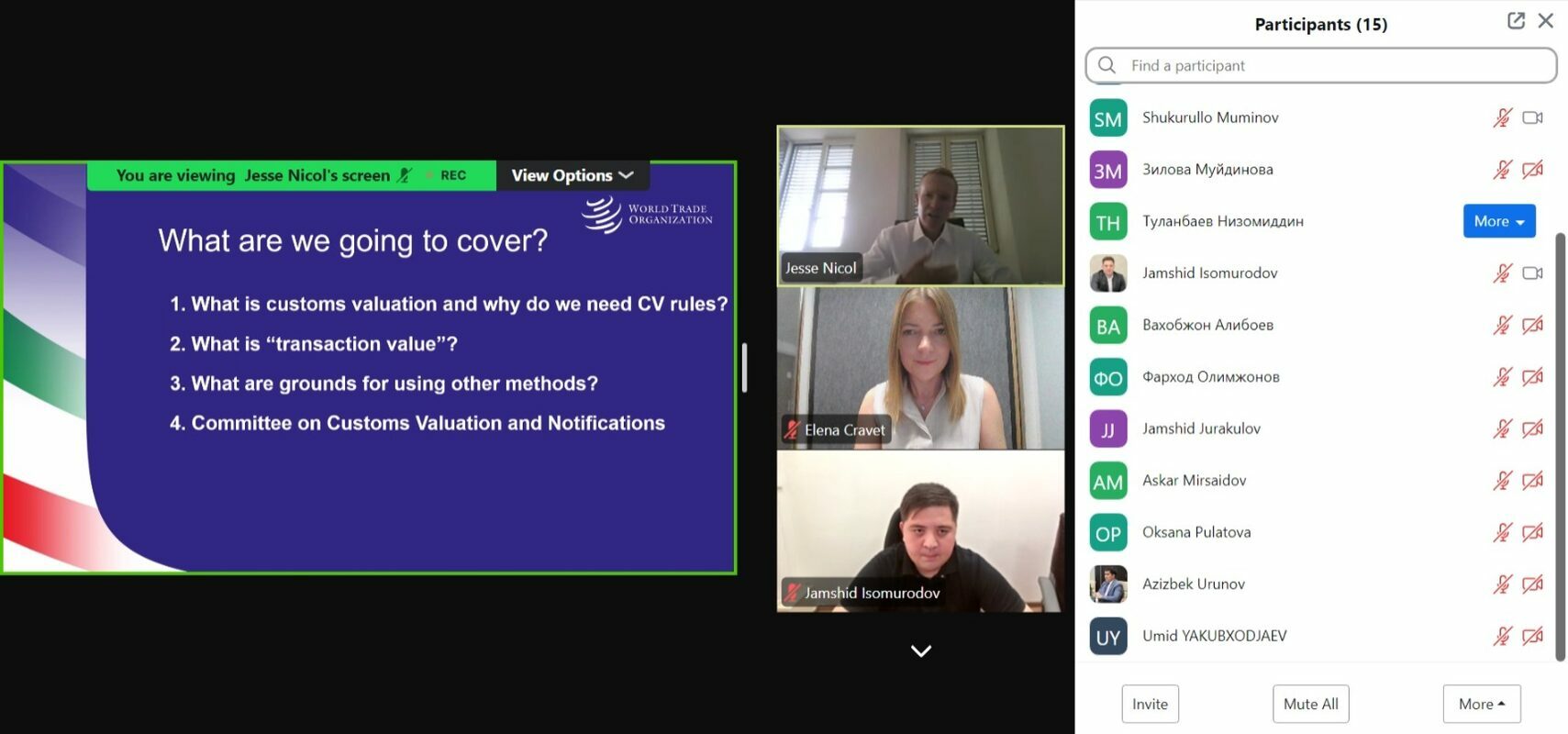Intensive training for Uzbekistan’s trade officials on WTO Agreements on customs practices
02.09.2024 2078The World Trade Organization (WTO) not only ensures open and fair trade between countries but also prioritizes the smooth and efficient movement of goods across borders.
Uzbekistan government officials participated in a comprehensive and accelerated training on customs issues under dedicated WTO Agreements.
The WTO rules on customs evaluation, Rules of Origin, and the Trade Facilitation Agreement are among the core agreements of the WTO dealing with customs matters.
The ITC in collaboration with WTO Secretariat organized the online course on 21 August 2024.
For players in international trade, the process of estimating the value of a product at customs presents challenges that can be as serious as the actual duty rate charged.
The WTO Agreement on Customs Valuation aims for a fair, uniform and neutral system for the valuation of goods for customs purposes — a system that conforms to commercial realities, and which outlaws the use of arbitrary or fictitious customs values.
Rules of origin are the criteria needed to determine the national source (so-called “nationality” or “origin”) of a product. Their importance is derived from the fact that import duties and restrictions in different cases depend upon the source of imports. There is wide variation in the practice of governments concerning the rules of origin.
Rules of origin play a crucial role in determining the trade regime applicable to imported products. They are particularly important in the context of free trade agreements, where preferential treatment is granted under specific rules of origin (nationality of the product). Additionally, for non-WTO members, rules of origin can influence how their products are treated, potentially excluding them from the benefits of the WTO's Most-Favoured-Nation (MFN) regime. Furthermore, rules of origin are essential when countries impose antidumping measures on specific products from particular countries, ensuring that such measures are applied accurately and fairly.
Rules of origin are therefore crucial for Uzbekistan in order to be able to take full advantage of the offered opportunities within the multilateral trading system, especially in the context of the preferential trade regimes.
Streamlining customs procedures
The Trade Facilitation Agreement was negotiated in an attempt to streamline and modernize border procedures and to improve customs cooperation between Member countries to ease the flow of imports and exports.
Countries’ customs processes are often cumbersome, outdated, and not harmonized. This causes a bureaucratic burden that adds unnecessary costs and delays when goods have to cross borders. The agreement seeks to speed up the movement, release and clearance of goods in transit and at borders.
The agreement also allows for developing countries to implement the measures according to their capacity under what is known as the special and differential treatment principle.
Twenty-five participants attended the training – either online or in person. Among them were Uzbekistan’s chief negotiator at the WTO, as well as government officials from core ministries and customs authorities.
Customs representative, Shukurullo Muminov, welcomed the capacity-building activities as ‘particularly useful’. He and colleague Jamshid Isomurodov asked practical questions about implementing the WTO’s Customs Valuation Agreement and the Trade Facilitation Agreement.
UWED students currently doing internships at the country’s WTO Task Force also attended the sessions, which were delivered by two well-known experts from the WTO Secretariat, Darlan Marti and Jesse Nicol.
The ITC, in collaboration with the University of World Economy and Diplomacy in Tashkent and the WTO Chairs Programme, organized the accelerated Trade Training Programme with funding from the European Union as part of the EU’s project Facilitating the process of Uzbekistan’s accession to the WTO.

